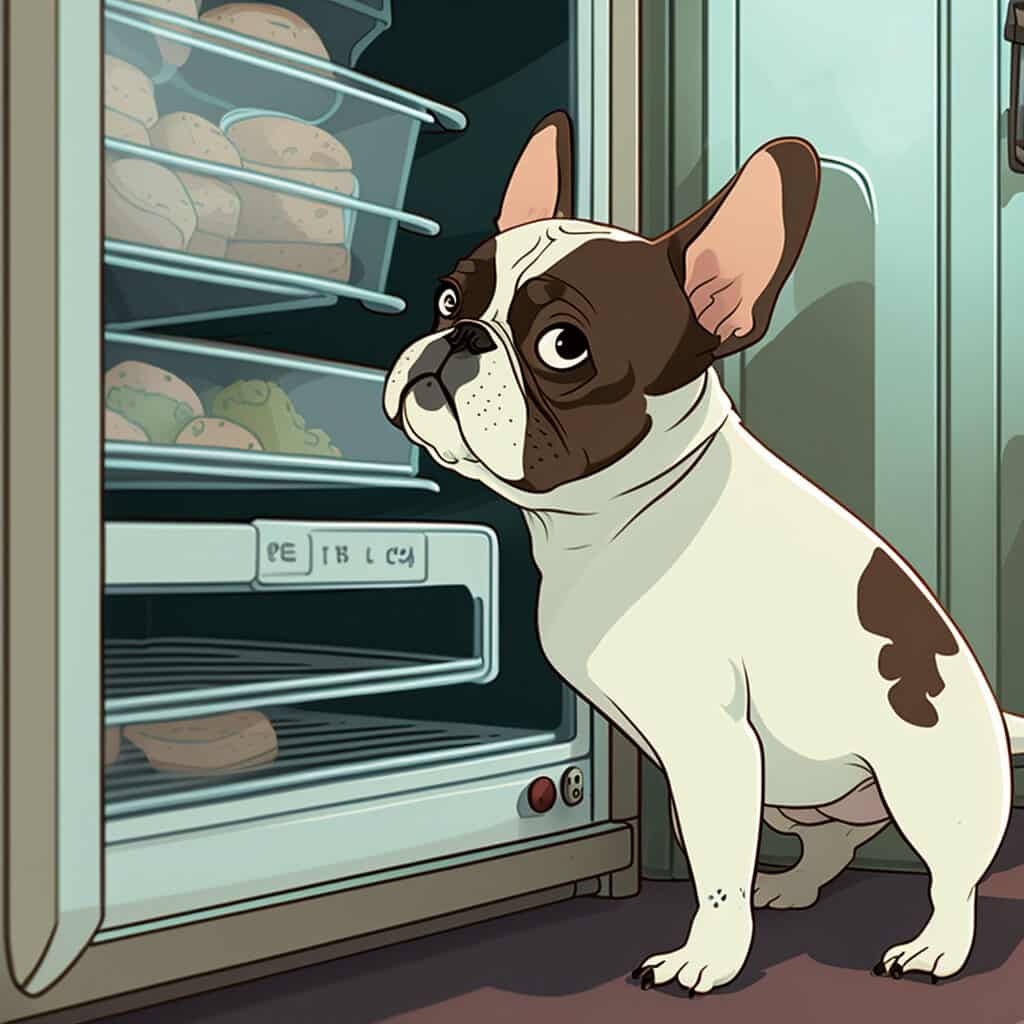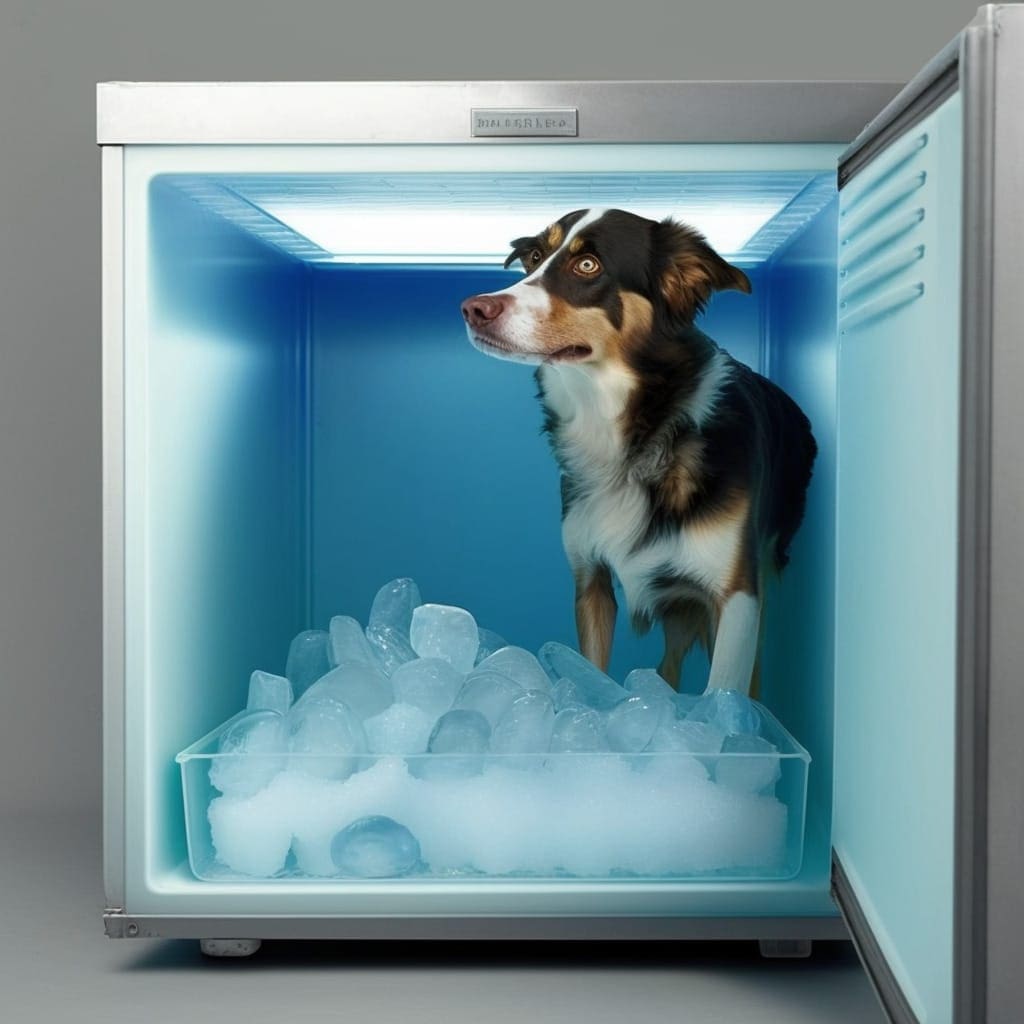Can you freeze dog food?
Many dog owners want to provide their pets with the best nutrition possible, but what happens when you buy a large bag of dog food that won’t be finished before the expiration date?
Freezing dog food can be a potential storage solution, but it’s important to understand if it’s suitable for all types of dog food. Let’s have a look at the world of freezing dog food, focusing on dry kibble, wet food, and raw food.

In terms of dry kibble, freezing can be a great way to extend its shelf life while maintaining quality. It helps slow down the natural spoilage process, keeping those kibble pieces fresh and nutritious for longer.
Remember to portion control, use airtight containers, and label them with the freeze date for effective freezing.
However, freezing wet dog food is not recommended due to potential changes in texture and taste.
As for raw dog food, consult with your veterinarian before freezing to ensure it’s done safely for your pup’s health.
Key Takeaways:
- Freezing Dry Kibble: It’s a handy trick to extend the shelf life of dry kibble, keeping it fresh and nutritious for longer. Remember to portion out the kibble, store it in airtight containers, and label with the freeze date for best results.
- Freezing Other Dog Food Types: While freezing works well for dry kibble, it’s not suitable for wet dog food due to texture and taste changes. Raw dog food freezing is controversial, so consult your vet before freezing to ensure your pup’s safety and health.
- Prioritizing Your Dog’s Health: Fresh food is always the best option for your furry friend. Freezing should be a temporary solution, not a permanent fix. Consult your vet or reputable pet food companies for any questions or concerns regarding freezing dog food.
Freezing Dry Kibble: Techniques and Tips
Some pet owners may wonder if freezing dry kibble is a viable option for extending its shelf life. The good news is that freezing can indeed help preserve the freshness and nutritional value of your dog’s food. Here are some tips and techniques to help you effectively freeze dry kibble:
Benefits of Freezing Dry Kibble
Kibble freezing can be a great way to extend the shelf life of your dog’s food. By slowing down the natural spoilage process, freezing helps keep the kibble fresh and full of nutrients for longer. This method can be particularly useful for pet owners looking to buy in bulk or who want to ensure their furry companions always have high-quality food available.
Step-by-Step Guide to Freezing Dry Kibble
Any experienced pet owner knows that proper storage is imperative for maintaining the quality of their dog’s food. Here is a step-by-step guide to freezing dry kibble effectively:
| Portion Control | Airtight Containers |
| Divide the kibble into meal-sized portions to avoid multiple freeze-thaw cycles. | Invest in freezer ready, sealed containers to stop freezer burn and odor absorption. |
This method ensures that your dog’s food stays fresh and appetizing for an extended period of time. Knowing how to freeze dry kibble correctly can make a significant difference in maintaining the quality of the food your pet consumes. So, follow these simple steps and rest assured that your furry friend is getting the best nutrition possible.
The Limits of Freezing: Wet Dog Food
Challenges with Freezing Wet Food
Even though freezing can be a godsend for dry kibble, it’s a different story when it comes to wet dog food. Any attempt to freeze wet food can lead to changes in texture and taste, ultimately resulting in a less appetizing meal for your beloved furry friend.
Recommendations for Storage of Wet Dog Food
Furthermore, freezing doesn’t do much to extend the shelf life of wet food, so it’s best to steer clear of stashing away those cans in the freezer.
Recommendations for storing wet dog food include keeping it in a cool, dry place away from direct sunlight to maintain its freshness. It’s important to seal the open cans tightly with an airtight lid and store them in the refrigerator once opened.
It’s good practice to use up wet food within a few days and avoid freezing it to prevent any unwanted changes in its quality.
https://www.gov.uk/
- freeze raw pet food until it is required
- use a dedicated container for storage
- keep raw pet food away from other food in the refrigerator or freezer
- defrost frozen pet foods away from other food, food preparation surfaces and equipment
- throw away any raw pet food that is not eaten as soon as reasonably practical
Raw Dog Food: Freezing Considerations
Potential Benefits of Freezing Raw Dog Food
Freezing raw dog food can be advantageous in preserving its freshness and nutritional value over time. Freezing raw food, you can extend its shelf life and ensure that your furry friend continues to receive the necessary nutrients they need. This method can be helpful for pet owners who prefer to buy raw food in bulk, allowing them to store it for longer periods without compromising quality.
Safety and Nutritional Concerns When Freezing Raw Dog Food
For pet owners considering freezing raw dog food, it’s important to be aware of potential safety and nutritional concerns. While freezing can help preserve the food, there may be a risk of nutrient degradation or bacterial growth if not done correctly.
It’s necessary to follow proper freezing and thawing procedures to minimize any nutrient loss and maintain food safety. With the limited research available on the impact of freezing raw food, consulting with a veterinarian before incorporating frozen raw food into your dog’s diet is highly recommended to ensure their health and well-being.
Best Practices for Dog Food Storage
Alternatives to Freezing
To ensure your dog’s food stays fresh and nutritious, despite not freezing it, consider storing it in a cool, dry place away from direct sunlight. You can also invest in smaller portions of dog food to minimize food waste and maintain freshness. Additionally, sealing the bag properly after every use can help prevent the food from going stale quickly.
Ensuring Freshness and Quality in Dog Food
To guarantee your furry friend is getting the best nutrition possible, always check the expiration date on the dog food packaging. Rotate your dog’s food supply regularly to ensure they are always eating fresh food. If you notice any changes in color, texture, or smell, it’s best to discard it to avoid any potential health risks to your pet.
As pet owners, it’s vital to prioritize the freshness and quality of your dog’s food. Keeping track of expiration dates, rotating their food supply, and monitoring any changes in the food’s appearance can help ensure your dog receives the best nutrition possible. By following these simple steps, you can provide your furry companion with the high-quality care they deserve.
Reflection: Can you freeze dog food?
On the question of “can you freeze dog food”, it’s clear that while freezing dry kibble can be a helpful way to extend its shelf life, it may not be suitable for all types of dog food. While dry kibble can benefit from freezing to maintain its freshness, wet dog food can lose its taste and texture when frozen, and the impact of freezing on raw food is still uncertain.
It’s important to prioritize your dog’s health by feeding them fresh, high-quality food whenever possible. Remember to consult with your veterinarian or reputable pet food companies for guidance on storing and managing your dog’s food to ensure they receive the best nutrition possible.
So, there you have it! Freezing dog food can be a lifesaver when it comes to extending shelf life, but remember, freshness is key. Dividing portions, using airtight containers, and labeling dates are just some tips to ensure your dog’s meals stay fresh and nutritious.
And if you’re ever in doubt, a quick chat with your vet can offer peace of mind. Your furry friend will thank you for it!”
FAQs
How to store dry dog food for a long term?
When it comes to storing dry dog food for a long term, the short answer is to keep the dog’s food in a cool, dry place. It’s best to store the food in its original bag, but if you need to transfer it to another container, make sure it’s an airtight one. You can also use zip lock bags for smaller portions. To further extend the shelf life, you can opt for freeze-dried food or freeze-dry dog food yourself. And remember, can you freeze dog food? Yes, but it’s more suitable for wet or fresh food rather than dry food.
How long can dog food be frozen?
If you’re wondering “can you freeze dog food?” – absolutely! Freezing dog food is a great way to preserve its freshness, especially if you have a picky eater on your hands. When properly stored, frozen dry food can last up to six months, while full meals made from fresh ingredients, such as organic fruits, vegetables, and human food, can last up to three months. For canned dog food, it’s better to store it unopened in a cool, dry place rather than freezing it.
Can you freeze wet dog food?
Can you freeze dog food, specifically wet dog food? Yes, you can! Freezing canned dog food is a great option for extending its shelf life or for creating a cool treat on hot days. Before freezing, transfer the wet food to an airtight container or individual portion-sized zip lock bags. Wet dog food can be safely frozen for up to two months. Just make sure to thaw it in the refrigerator before serving it to your furry friend.
How long should you freeze dog food to kill mites?
If you’re concerned about mites in your dog’s food, freezing can help. The short answer to “can you freeze dog food to kill mites?” is yes. To effectively eliminate mites, freeze the dog food for at least 48 hours. This applies to both dry and wet dog food. After freezing, allow the food to return to room temperature before serving it to your pet. Remember, maintaining proper storage conditions is essential to keeping your dog’s food safe and healthy
How should I freeze dry dog food?
When freezing dry dog food, portion control is key. Divide the kibble into meal-sized portions to avoid quality issues from multiple freeze-thaw cycles. Use airtight containers to prevent freezer burn and odors. Label containers with the freeze date to track how long the food has been frozen.
Is freezing suitable for all types of dog food?
While freezing works well for dry kibble, it’s not recommended for wet dog food due to texture and taste changes. Freezing raw dog food is a bit more complex, with limited research on its impact. If considering freezing raw food, consult with your veterinarian to ensure it’s done safely and doesn’t compromise your dog’s health.

